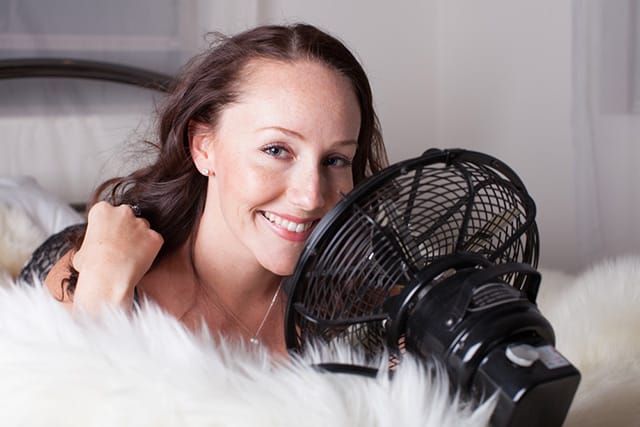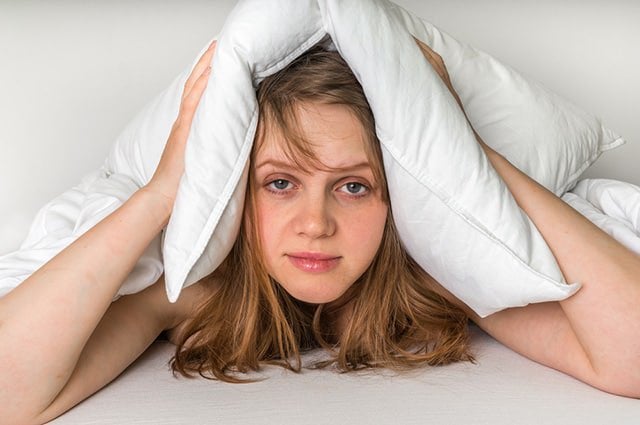Whether it’s the long, summer months that have you blasting your fan or it’s just a preference to sleep with circulating air in the room, ceiling or stationary fans can be a huge help. There’s really no better feeling than coming in from a hot day being outside and sitting in front of a cool fan, but what about sleeping with a fan? Is sleeping with a fan on bad for you?
It’s a common concern when mixing sleep with having a fan on. You hear plenty of reasons why someone shouldn’t sleep with a fan on for people suffering from allergies, noise sensitivity or someone who gets chills easily but is there a medical reason why you shouldn’t sleep with a fan on? And similarly, is sleeping with a fan bad for a cold? Although each individual is different, there are plenty of reasons why you should and shouldn’t sleep with a fan on – all having to do with personal preference. In this article, we will answer some common questions revolving around sleeping with a fan, such as is sleeping with a fan bad for your health or is sleeping with a fan bad for your ears? Keep reading for some interesting information on whether or not you should be sleeping with that fan on!
You may be interested in: Best Box Fans for the Bedroom
Benefits of Sleeping with a Fan on
Some people couldn’t imagine not sleeping with a fan on. If you grew up in a bedroom with a fan as a child, you’re probably going to be more inclined to sleep with a fan on through your adult life. In fact, if you do have to sleep in a room without a fan, it could even keep you from sleeping well once you’re used to it.
Sleep Sounds
One of the major benefits of sleeping with a fan on (especially if you grew up using a fan as a child) is the sound. Some people prefer to fall asleep to some white noise, and that lulling hum of a fan is an ideal sound to fall asleep to. Having to fall asleep in a completely silent room can be daunting, so having some fan noise could help put you to sleep faster than you would think. Fan noises also help drown out the sounds of traffic or other people, depending where you are and what types of noises would be present. Some people are so used to ambient noises, that they purchase sleep machines to help lull them to sleep. Here’s a video solely dedicated to the soothing sounds of a fan.
Cool and Comfy
A pretty obvious one since most people use fans to keep them cool, but sometimes fans are a definite need in the bedroom if you want to normalize your sleep temperatures. There are some people who tend to get hotter than most when fast asleep. Some people’s bodies do naturally heat up while asleep, but some individuals can run hotter than others which would make sleeping without a fan an absolute horror. For hotter sleepers especially, sleeping with a fan on is necessary.
Air Circulation
If you are someone who tends to feel claustrophobic in a smaller room or where there isn’t much airflow, sleeping with a fan on is a major solution to this problem. Whether you have asthma or you get anxiety from smaller spaces, having a fan in the room will help open up the room with so much circulating air and relieve that cramped feeling. It can also help you breathe better since the constant airflow will make your lungs feel open and your body cooler. If you’re trying to sleep in a room with absolutely no airflow, the air may seem heavy and hard to breathe in. Naturally, airflow will help promote restful sleep.
You may be interested in: Best Quiet Fans for Sleeping and White Noise
Downsides to Sleeping with a Fan on
Drying Out
Is sleeping with a fan bad for skin? Well, it can be – if your skin is sensitive or prone to drying out easily. If you sleep with a fan on high blast and you have dry skin, there is a chance the fan could make it worse. Using plenty of lotion or moisturizers should aid in this, but if you suffer from overly dry skin, maybe skip out on the fan. Also, some people are prone to having dry eyes. Sleeping with a fan on can sometimes worsen symptoms and make the problem even worse if you don’t sleep with your eyes completely closed. Obviously, you won’t know this is the case since you’re asleep, but an eye doctor can determine whether or not you sleep with your eyes partially open. Special drops would need to be prescribed for this.
You might be interested in: Best Cooling Fans for Your Bedroom
Allergy Issues
If you’re someone who suffers from seasonal allergies or sinus issues, sleeping with a fan on might just make these symptoms worse. A blasting fan will undoubtedly kick up any dust or spores lying around a room, especially a room where a fan isn’t used often. All these fresh dust could most certainly cause some allergy issues and sinus discomfort. If you take medication for these issues, then you should be sure to pack them in your overnight bag if you’re staying in a hotel or a new place since you don’t know exactly what the fan could be kicking up. Medications should ease the symptoms, but if the problem persists, it’s better to just sleep without the fan on.
Body Issues
Is sleeping with a fan bad for your back or hearing? Both of these are valid concerns since there have been reports of people having discomfort in their muscles and ears after sleeping with a fan, especially if the individual isn’t accustomed to sleeping with a fan on. Although sleeping with a fan shouldn’t cause a significant amount of pain in healthy muscles or ears, it isn’t a huge stretch that discomfort could occur. If you have sore muscles, the constant flow of cold air hitting your body could make these muscles contract – causing more pain. The same goes for ears – if you have a preexisting ear infection, that’s not to say cold air couldn’t make your ear infection worse. The key would be to determine what would be best for your body and go from there.
You may want to check out: The Best Bed Fans to Keep You Cool at Night
Conclusion
Overall, sleeping with a fan on is really a personal choice. If you’re a hot sleeper who grew up sleeping with a fan on, then for sure go with the fan. If you have sensitive muscles or are prone to dry eyes, the safest bet for you would be to sleep with the fan off. Whatever you choose, sleeping with a fan can be a good or a bad thing depending on your particular body and health. Have any thoughts or experience with any of these issues mentioned in this article? We’d love to hear your insight and comments below!



